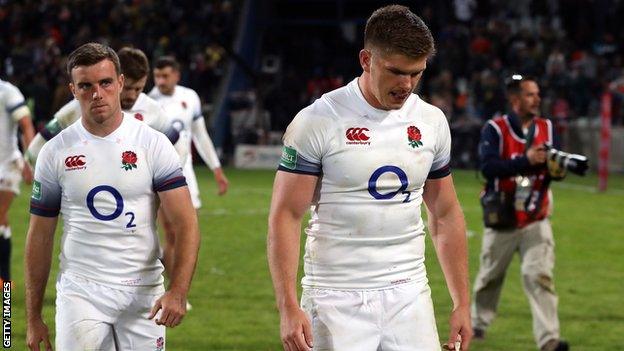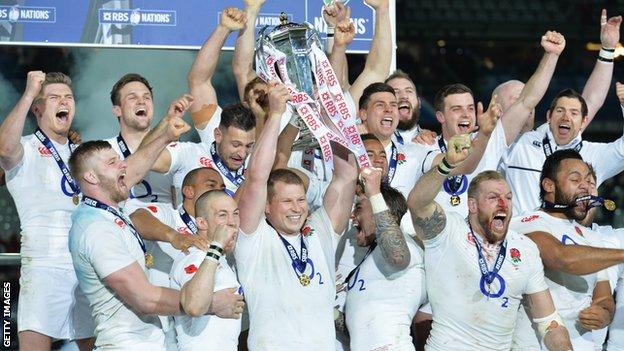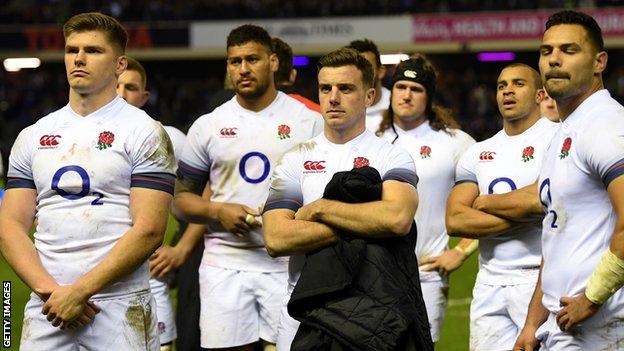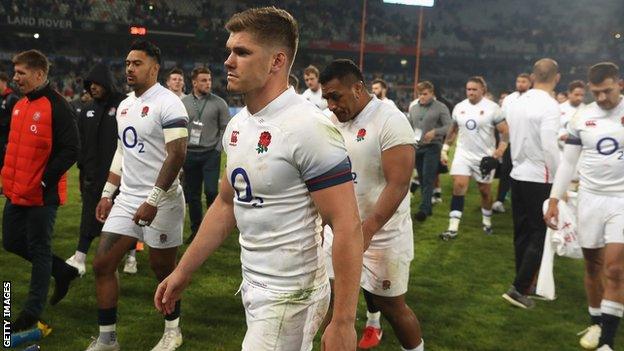South Africa v England: What has gone wrong for Eddie Jones' side?
- Published

England's poor run went from bad to worse with defeat in the second Test against South Africa on Saturday
Eddie Jones is not a man given to public declarations of failure or crisis.
Even as his England team slipped to a sixth successive loss - including defeat by the Barbarians - in Bloemfontein on Saturday, the series against South Africa gone before the third Test, a worst-ever Six Nations finish of fifth still fresh in the memory, Jones was speaking of improvement and opportunities and what-might-have-beens.
World Cup campaigns are not supposed to unfold this way.
There are 15 months to go until England meet Tonga in Sapporo, but where once was an 18-match winning streak now sit repeated failings.
Another defeat in the final Test could see them slip to fifth in the world rankings, with South Africa and New Zealand their next two opponents in November.
Jones likes his rugby history, which is just as well, for that is where the only real consolation lies.
Less than a year before storming to the 2011 World Cup semi-finals, Wales had completed a seven-match winless streak by drawing at home with Fiji.
The year before England reached the final of 2007, they had lost seven games in a row, including defeats by Scotland, at home by Argentina and by a 25-point margin against France.
In October 2014, Australia were sacking their head coach Ewen McKenzie; in October 2015 they were within four points of the All Blacks with 15 minutes of the World Cup final to go.
Jones' critics will see this not so much as light at the end of the tunnel as the sun setting on what was once such a bright day.
Have Jones' England already peaked?

England won the Six Nations Grand Slam under Jones in 2016
His England side won a Six Nations in his first season in charge through cussedness and physical strength, and then made history by whitewashing Australia on their own patch.
That was meant to be the start. Instead, two summers on, it increasingly feels like the peak, and a distant one at that.
This is not the first England side to struggle in South Africa. They have never won a three-match series there. On their last trip to Bloemfontein, 11 years ago, they lost 52-10.
But that was a Springbok team that would be crowned world champions five months later, not a side who are improving from a very dark place. England also lost five Tests in a row in 2014, but in that run they met the All Blacks four times.
There are other excuses the generous might throw the way of Jones. No other home nation has seen its Lions stars given so little respite after that most gruelling of tours a year ago.
An attritional Premiership season has cost him personnel and vigour from some of those who have made the trip.
But Premiership seasons have always been like that, and England coaches have all battled the same issues of player burn-out and injury since the start of the professional era. This slump is not routine. This crisis will not be easily solved.
England are not in a rut - they are in a trench

England's run of defeats started with a loss against Scotland at Murrayfield in the Six Nations
Jones has talked about improving his players' fitness. Others see a coach struggling to see when players might need a rest or understanding that sometimes doing more does not always bring better results.
That first, successful, season was all about the defence, according to Jones.
Well, England have conceded 16 tries in their last three matches, one of which was against the scratch cavaliers of the Barbarians.
In Test matches in the southern hemisphere, Jones' England have conceded an average of almost 30 points a match. There are many ways to win a World Cup but shipping points like that would be a novel one.
The second season, Jones told us, would be about attack. There have been moments, late in this third campaign, when England have shown brilliance out wide. They have also then spluttered to a halt. On Saturday they failed to score a single point in the last 67 minutes.
Jones blamed his side's indiscipline for their Calcutta Cup defeat in February, when they conceded 13 penalties. In their next match, against France, they shipped eight penalties in the first half alone. A week later against Ireland they conceded 11 more.
If that suggests a rut, this series has shown a trench. In the first Test England were penalised 17 times. On Saturday they conceded 13. Test matches are not won this way, not unless you are running amok elsewhere.
Some penalties have an inevitable feel about them. Others are pragmatic. Then there are those that hint at a deeper malaise in a side's approach: Mako Vunipola, sin-binned a week ago, slapping Pieter-Steph du Toit at the bottom of a ruck; Nathan Hughes sin-binned for knocking the ball from Faf de Klerk's hands.
All teams make mistakes. It is the repeated ones that are hard to take. In the first Test, England led 24-3 before losing 42-39.
In Bloemfontein they were 12-0 up in a flash and dash, and then shipped 23 points without reply. Imagine what it would be like if they actually went behind early.
These are not new issues. England were undone at the last World Cup by problems at the breakdown, by flaws in selection, by an inability to react to the way a game was being refereed or how an opponent was finding success.
What next for Jones and England?

England have just over a year until there opening World Cup game in Japan
Jones inherited Stuart Lancaster's team and found immediate success by making minimal tweaks - bringing back Dylan Hartley as his hooker and figurehead in place of Tom Youngs, giving the talent of Maro Itoje its head.
He is now struggling to move that same team on, his selection hinting at revolution with the rapid promotion of Brad Shields but spelling conservatism in his refusal to give Danny Cipriani more than a wasted cameo with a match and series already decided.
Jones was lauded for his win at all costs mentality. That same pick of Shields can be read another way: a shrug of the shoulders at the idea of a development pathway through English rugby, a focus only on this regime rather than a legacy for the next.
There are rumours of discontent within the camp and high-profile departures from both his coaching team and the support staff.
Some elite sporting environments thrive on constant change. Then you look at the security of tenure at the All Blacks, and you wonder.
Jones' experience is undoubted. So too is the sense that this England team is currently less than the sum of its parts, which is the most basic rule of thumb for a coach's impact.
He can look at that history, and his many successes as a coach, and believe that this is a low that will prove critical to his team's development. He could also look back on his time with the Wallabies, and the eight defeats in his final nine games in charge.
Something has to change for England. Jones has never had a more challenging task.
- Published16 June 2018

- Published16 June 2018

- Published15 June 2018
